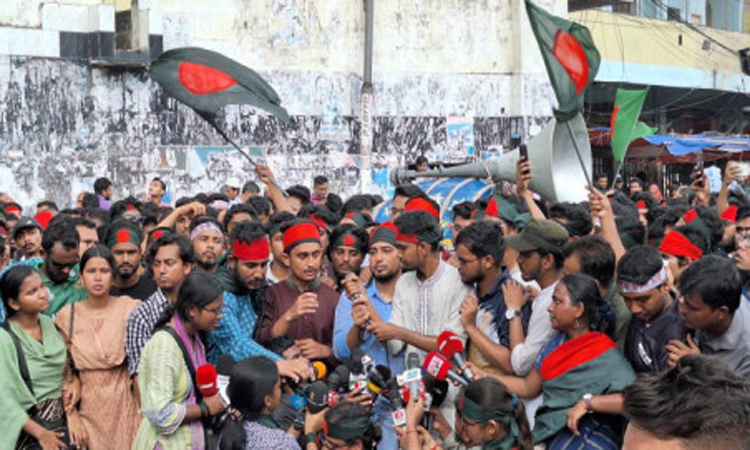News Flash

DHAKA, July 21, 2025 (BSS) - Nahid Islam, a key coordinator of the anti-discrimination student movement, declared an emergency four-point demand with a 48-hour ultimatum on July 22 last year amid a nationwide mass arrest carried out by law enforcers.
In his announcement, he also temporarily suspended their "complete shutdown" programme.
The four-point demands included the full restoration of internet access nationwide, the immediate withdrawal of the curfew, removal of law enforcement personnel from educational institutions and reopening of all residential halls to create a safe and conducive environment for academic activities, and ensuring safety and security for all coordinators of the quota reform movement across the country.
However, the members of law enforcement agencies were conducting a nationwide ‘combing drive' to arrest the people, especially BNP and Jamaat leaders and activists, across the country on charges of carrying out widespread violence, vandalism and arson attacks during the quota reform movement.
According to a Dhaka based Bangla daily- Prothom Alo, a total of 1,200 people including leaders and activists of BNP and Jamaat-e-Islami were arrested by police and the Rapid Action Battalion (RAB) until July 23 morning while the total number of arrests nationwide exceeded 2,000 since July 17.
Of the arrestees, 516 were detained from different parts of the capital in six hours between 12 midnight of July 22 and 6 am on July 23.
Besides, a total of 164 cases had been filed across the country over incidents of arson attacks, vandalism, and clashes. Among these, 71 cases were lodged under the Dhaka Metropolitan Police (DMP), 14 in Chattogram, and 79 in other districts.
However, according to a leading English daily- The Daily Star- at least 1,427 people were arrested on July 22 across the country. Of them, 692 people were arrested from the capital alone. Besides, the DMP conducted block raids to arrest the demonstrators.
Besides, six more people, who were injured during the movement in previous days, died on July 22, the Daily Star reported. Of them four died at Dhaka Medical College Hospital (DMCH) and two at National Institute of Neuro Sciences and Hospital.
According to another English daily- The New Age- the DMCH handed over 70 bodies of deceased to their families between July 19 and 22 while the total death toll stood at least 155.
After nearly a week of violence and chaos, no incident of violence or clash was reported in the capital on the third consecutive day of the nationwide curfew while a huge number of army, BGB, police and RAB personnel were deployed across the city.
Armored military vehicles were stationed at key points, and police and RAB helicopters hovered in the sky. Despite the presence of a huge number of law enforcers, several hundred protesters blocked roads in Mohakhali for a short period until they were dispersed by law enforcers.
As the curfew was relaxed for three hours on July 22 between 2pm and 5pm, people were seen moving across the city to perform their emergency tasks. Though there was no violence but the situation was far from normal as the people were in fear of getting arrested since law enforcers were accused of arresting people indiscriminately.
On the day, Chief of Army Staff General Waker-Uz-Zaman visited different spots in the city including Jatrabari, which came under control after five days since the student-people made a stiff resistance on July 17.
After visiting the spots, the army chief said normalcy would return across the country soon with the help of all as the situation was improving.
The then Police Inspector General (IGP) Chowdhury Abdullah Al-Mamun, RAB Director General Md Harun-Ar-Rashid and DMP Commissioner Habibur Rahman also visited the Jatrabari area.
Speaking to journalists there, the IGP said, "Everyone involved in criminal activity will be held accountable."
That day, the then home minister Asaduzzaman Khan Kamal said that the curfew would remain imposed for further stability while it would be relaxed between 1pm and 5pm. The government would extend the curfew-free period based on improvement of the situation, he added.
The government also extended the general holiday by one more day on July 23 through an executive order while internet services had remained suspended nationwide for the fifth consecutive day.
On July 22 evening, the then Prime Minister Sheikh Hasina signed the summary placed by the Ministry of Public Administration over issuing a circular reforming the quota in government jobs.
Earlier on the day, she held a meeting with business leaders at her official residence Ganabhaban where she squarely blamed the BNP, Jamaat-e-Islami and Islami Chhatra Shibir for the violent attacks and vandalism during the movement and warned of taking "stronger action" against them.
Besides, the University Teachers' Network (UTN) on July 22 issued a statement asking the government to withdraw curfew and resume internet services to end the public sufferings.
The platform also called for immediate stopping of mindless killings and tracing those who went missing since the movement.